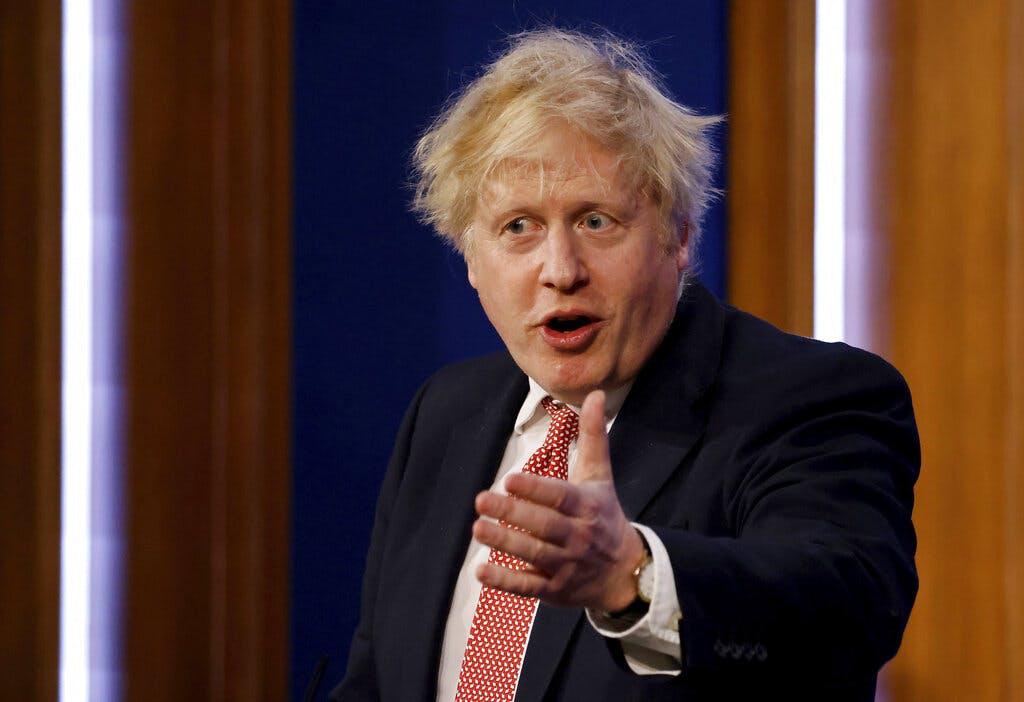Freed From the EU, Britain’s Johnson Provides Leadership Europe Needs
During the span of Britain’s EU membership, every European conference saw the United Kingdom isolated and outflanked.

The Ukraine crisis has suddenly thrown into sharp relief the sea change that followed the exit of Britain from the European Union.
Sprung from the straitjacket of the EU, Boris Johnson has secured more diplomatic success among European leaders as a prime minister outside the EU than any of his predecessors had while the country was in the EU.
During the span of Britain’s EU membership, every European conference saw the United Kingdom isolated, outflanked, and left with little to show for a country that viewed itself as a major world power taking part in a continental economic and political union.
Germany and France found uniting against British objections easy, almost second nature. Smaller countries more like-minded to British intentions — the Netherlands and Denmark early on; Poland, Hungary, and the Czech Republic more recently — relied upon the U.K. to make a stronger case for free markets and decentralization, but often failed to back Britain when push came to shove.
The more fluent multilingualism of Britain’s opponents gave them a strategic advantage, and British politicians often perceived that their own civil servants were sometimes working against them “in the European spirit” or failing to go the whole nine yards in protecting British interests.
Prime Minister Cameron’s earlier attempt at renegotiating the terms of Britain’s EU membership in advance of the Brexit referendum proved his country’s total impotence in Europe. Had the EU given way on restricting free movement of people to workers with job offers, it seems likely U.K. voters would have voted to stay in the union. As the English phrase puts it, sometimes you must cling to nurse for fear of something worse.
For all the devotion to Europe that Britain’s pro-EU press, political, and academic establishments proclaimed, they could rarely be relied upon to pay much attention to continental affairs. Eurosceptics might be called out for objecting to EU laws once made, but Britain’s heavily pro-EU press and television rarely paid much attention to how regulations were hammered out in Brussels.
The 2020 American presidential election provided a strong case in point of this lack of interest. Choosing the next “leader of the free world” was no doubt a process worthy of U.K. media attention, but in the run-up to Germany’s CDU choosing a successor to Chancellor Merkel, the BBC — just one among many — was almost completely silent.
This past week and the evolution of Britain and Europe’s response to the Kremlin has shown the fundamental transformation of power dynamics in Europe. From the beginning, Mr. Johnson has advocated a vigorous, wide-ranging response but has refrained from saber-rattling jingoism.
As a student of history from ancient Greece to the present, the prime minister is well aware of the law of unintended consequences and the risks of escalation. Today he’s actively working to make sure it is President Putin who is the victim of unintended consequences rather than the free peoples of Europe and the United Kingdom.
As Russia massed 100,000 troops on Ukraine’s borders in early February, Mr. Johnson flew to Kiev to meet with President Zelensky, asserting that “as a friend and a democratic partner,” Britain would continue “to uphold Ukraine’s sovereignty in the face of those who seek to destroy it.”
This week, Mr. Johnson flew to Warsaw to meet the Polish prime minister before moving on to Tallinn for a joint news conference with the NATO secretary-general and Estonia’s prime minister.
In London, Defense Secretary Ben Wallace described Russia’s claims of NATO encirclement as “outlandish,” pointing out that only one-sixteenth of Russia shared a border with a member state of the purely defensive alliance. “If Russia has concerns about the enlargement, it should perhaps ask itself why, when people were free to choose, they chose NATO,” he said.
Just days ago, both Germany and Italy were united in their attempt to torpedo efforts to see Russia removed from the SWIFT financial transaction system. Germany’s flawed strategy of closing its nuclear power plants has left the country even more at the mercy of Russian energy supplies, while a segment of its political class has personal financial ties to Kremlin-linked companies.
Italy, meanwhile, was alleged to have sought protections exempting its luxury goods brands — popular amongst Russian elites — from the economic measures targeting Moscow.
The strength of post-Brexit U.K. leadership has persuaded both these countries to step away from a position of extreme reticence and toward becoming active supporters of the lead Britain has taken, also backed up by the Netherlands and the Nordic countries. Europe — whether those countries inside the EU or those outside it — seems much more united in its response to Russia now than it did the day Mr. Putin’s troops moved against Kiev.
Mr. Johnson’s skill in rejecting the crazy war faction and the surrender monkeys has set the tone.
The great irony is that the calm, level-headed, moderate-but-strong leadership that Britain’s EU supporters always claimed they wanted but never got has been achieved by the very prime minister whose raison d’être was getting Brexit done.
